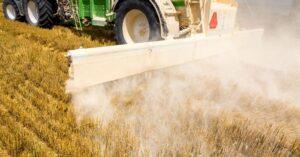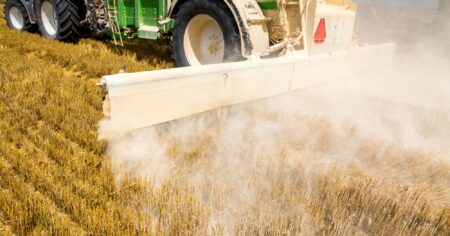By Cami Koons
A bill advanced from the Iowa House Thursday that would regulate anaerobic digesters, or systems that break down organic material in an oxygen-deprived system to produce usable biogas and fertilizer, at animal feeding operations.
House File 989 would task the Iowa Department of Natural Resources with regulating the construction, expansion, placement and operation of anaerobic digesters and associated structures that hold manure feedstocks at animal feeding operations.
The bill describes anaerobic digestion in three steps. First the feedstock, both liquid and dry animal waste, is stored. Next, the feedstock is “digested” in a structure specifically designed for anaerobic digestion. As the material is broken in the digester, the bio gas is extracted. The final step takes the leftover material, called the digestate, and either stores it or applies it as organic material to farmland.
Rep. Mike Sexton, R-Rockwell City, said the bill draws a “distinct line” between animal feeding operations and anaerobic digesters so the two can be enforced properly.
Sexton said under current regulations, any compliance issues that happen with an anaerobic digester are put on the livestock operation because the digesters don’t have their own licenses with the state.
Under the bill, operators would have to apply for a construction permit from DNR before building an anaerobic digester, or any of the related storage structures. This permit would require information on things like construction, size, operators and how the digestate would be applied.
The bill states anaerobic digesters must comply with separation distances for clean air regulations and follow the same water quality separation distances put on animal feeding operations. The bill lists civil penalties for operations that do not comply with these regulations.
According to data from the U.S. Environmental Protection Agency, Iowa has fewer than 10 anaerobic digesters on livestock operations — most are at dairies.
Rep. Lindsay James, D-Dubuque, spoke in support of the bill, but said she hopes for more conversation moving forward on the impacts to the environment and health.
“There (are) remaining environmental concerns, there’s health concerns around this technology, and I believe that there should be a lot more robust conversation going forward,” James said.
An article from the Iowa Chapter of the Sierra Club called the Iowa bill a “bandaid on a bigger problem” with the agricultural industry. The environmental group, which registered against HF 989, said the bill does not provide adequate separation distances from houses and other structures and will encourage animal feeding operations to expand.
Sexton said he does not believe the regulations will inspire more concentrated animal feeding operations, or CAFOs, to be built in Iowa because “there’s just not that much money in farming right now.”
“These anaerobic digesters are going to get built on existing animal feeding operations,” Sexton said.
Anaerobic digestion can generate renewable energy from other feedstocks, including things like food waste. Sexton has also worked on an additional bill, House File 987, that would create regulations for “community anaerobic digester systems” that use organic material other than animal manure.
Sexton said his amendment to HF 989, which passed, brought the language in line with the other digester bill.
PFAS Amendment
Rep. Monica Kurth, D-Davenport, filed an amendment to the bill that would require testing the materials in the digester structure for perfluoroalkyl and polyfluoroalkyl, commonly known as PFAS, substances.
“They are everywhere, and they are aptly named forever chemicals because they don’t break down, they don’t go away,” Kurth said.
Kurth said the amendment would prevent digestate with high levels of PFAS from being applied to the land.
The amendment is similar to House File 723, which required water treatment plants to test sewage sludge for PFAS, and notify landowners of the results before the sludge was applied as fertilizer. HF 723 did not advance ahead of the legislative funnel deadlines.
Sexton urged the body to reject the amendment and said DNR would have opportunities to write additional rules on such matters.
“I appreciate the amendment, but Iowa’s farmers are very concerned about what they put on their farm ground,” Sexton said. “They’re the ones that have to live there. They’re the ones that have their livestock on that ground.”
Kurth’s amendment failed, 59-32.
Rep. J.D. Scholten, D-Sioux City, said he had several concerns with what he perceived as loopholes in the bill, but said he appreciated the efforts on HF 989, especially in comparison to the anaerobic digestion policy in the governor’s energy bill, that he said was “very concerning.”
The bill will advance to the Senate, and Sexton said he hopes to see the community digester bill advancing soon.
Iowa Capital Dispatch is part of States Newsroom, a network of news bureaus supported by grants and a coalition of donors as a 501c(3) public charity. Iowa Capital Dispatch maintains editorial independence. Contact Editor Kathie Obradovich for questions: [email protected]. Follow Iowa Capital Dispatch on Facebook and Twitter.


:max_bytes(150000):strip_icc()/Green-wheat-farm-clouds-blue-af518f63f73541dfbcbc1837727e2068.jpeg)
:max_bytes(150000):strip_icc()/51040382571_e6791ae671_o-2000-52912d7b728646c0b32c38ee0690db60.jpg)



:max_bytes(150000):strip_icc()/1.-Goodrich-Farm-in-Salisbury-VT-food-waste-and-manure-to-RNG-Photo-by-Todd-Balfour-scaled-d6be832b7be54bcba16f6069b996eb8e.jpeg)


:max_bytes(150000):strip_icc()/50028573847_e980d495b4_o-6625ede4b02740578e9bfb98936e4112.jpeg)
:max_bytes(150000):strip_icc()/W100D_StgV_MY25_523-59ff7795aacc4194a50fb00d1314de91.jpg)